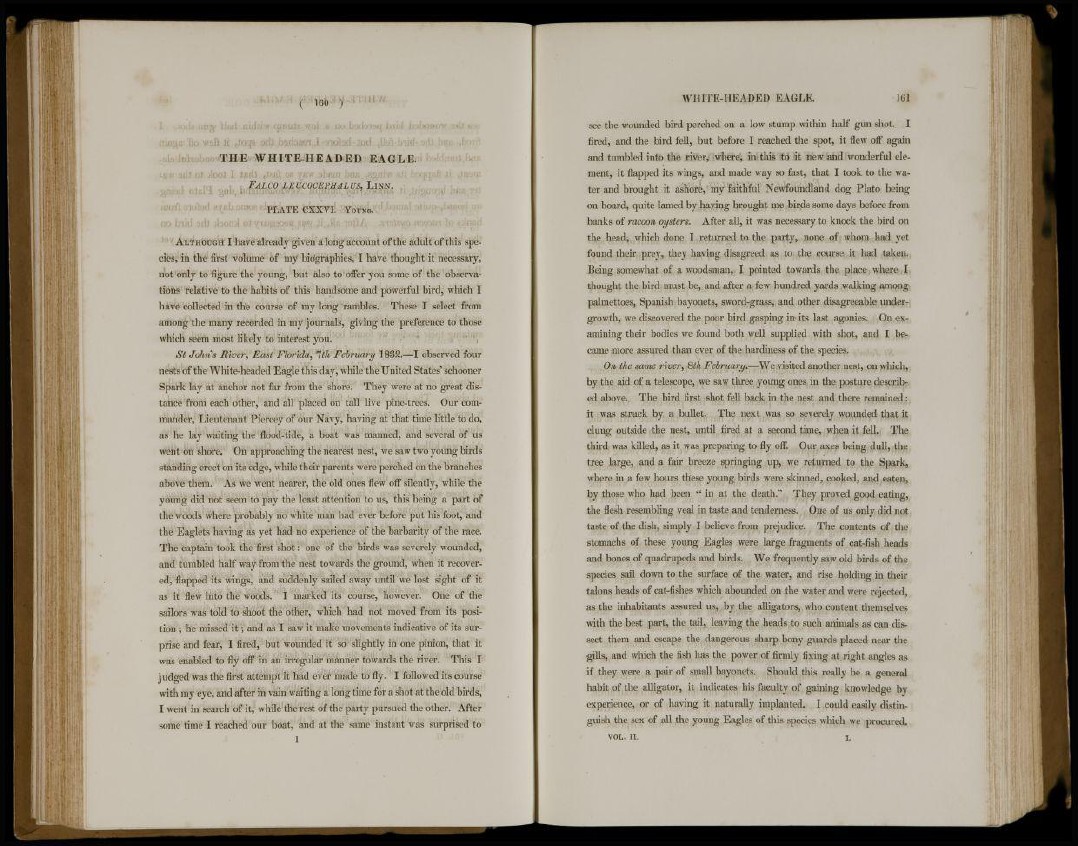
T H E W H I T E - H E A D E D EAGLE.
-ftwaxii oi iool I ißdi,^üfii os yp*r abßm briß ^gniw aii boc|qßä #j .toftf
filfift ^COCEPHALUS, LlNN.
P L A T E C X X V I . YOUNG,
00 biui HtlS jloOXUl OJ Vlß»iBi)39S 3ß3W,il" Iii J '193iA .ftt^i&VO iV00'-Wy\ to 3Jiffcßö
ALTHOUGH I have already given along account of the adult of this species,
in the first volume of my biographies, I have thought it necessary,
not only to figure the young, but also to offer you some of the observations
relative to the habits of this handsome and powerful bird, which I
have collected in the course of my long rambles. These I select from
among the many recorded in my journals, giving the preference to those
which seem most likely to interest you.
St John's River, East Florida, 1th February 1832.—I observed four
nests of the White-headed Eagle this day, while the United States' schooner
Spark lay at anchor not far from the shore. They were at no great distance
from each other, and all placed on tall live pine-trees. Our commander,
Lieutenant Piercey of our Navy, having at that time little to do,
as he lay waiting the flood-tide, a boat was manned, and several of us
went on shore. On approaching the nearest nest, we saw two young birds
standing erect on its edge, while their parents were perched on the branches
above them. As we went nearer, the old ones flew off silently, while the
young did not seem to pay the least attention to us, this being a part of
the woods where probably no white man had ever before put his foot, and
the Eaglets having as yet had no experience of the barbarity of the race.
The captain took the first shot: one of the birds was severely wounded,
and tumbled half way from the nest towards the ground, when it recovered,
flapped its wings, and suddenly sailed away until we lost sight of it
as it flew into the woods. I marked its course, however. One of the
sailors was told to shoot the other, which had not moved from its position
; he missed i t ; and as I saw it make movements indicative of its surprise
and fear, I fired, but wounded it so slightly in one pinion, that it
was enabled to fly off in an irregular manner towards the river. This I
judged was the first attempt it had ever made to fly. I followed its course
with my eye, and after in vain waiting a long time for a shot at the old birds,
1 went in search of it, while the rest of the party pursued the other. After
some time I reached our boat, and at the same instant was surprised to
l
WHITE-HE A I) E D EAGLE. 1Ü1
see the wounded bird perched on a low stump within half gun shot. I
fired, and the bird fell, but before I reached the spot, it flew off again
and tumbled into the river, where, in this to it new and wonderful element,
it flapped its wings, and made way so fast, that I took to the water
and brought it ashore, my faithful Newfoundland dog Plato being
on board, quite lamed by having brought me birds some days before from
banks of racoon oysters. After all, it was necessary to knock the bird on
the head, which done I returned to the party, none of whom had yet
found their prey, they having disagreed as to the course it had taken.
Being somewhat of a woodsman, I pointed towards the place where I
thought the bird must be, and after a few hundred yards walking among
palmettoes, Spanish bayonets, sword-grass, and other disagreeable undergrowth,
we discovered the poor bird gasping in its last agonies. On examining
their bodies we found both well supplied with shot, and I became
more assured than ever of the hardiness of the species.
On the same river, 8th February.—We visited another nest, on which,
by the aid of a telescope, we saw three young ones in the posture described
above. The bird first shot fell back in the nest and there remained:
it was struck by a bullet. The next was so severely wounded that it
clung outside the nest, until fired at a second time, when it fell. The
third was killed, as it was preparing to fly off. Our axes being dull, the
tree large, and a fair breeze springing up, we returned to the Spark,
where in a few hours these young birds were skinned, cooked, and eaten,
by those who had been " in at the death.11 They proved good eating,
the flesh resembling veal in taste and tenderness. One of us only did not
taste of the dish, simply I believe from prejudice. The contents of the
stomachs of these young Eagles were large fragments of cat-fish heads
and bones of quadrupeds and birds. We frequently saw old birds of the
species sail down to the surface of the water, and rise holding in their
talons heads of cat-fishes which abounded on the water and were rejected,
as the inhabitants assured us, by the alligators, who content themselves
with the best part, the tail, leaving the heads to such animals as can dissect
them and escape the dangerous sharp bony guards placed near the
gills, and which the fish has the power of firmly fixing at right angles as
if they were a pair of small bayonets. Should this really be a general
habit of the alligator, it indicates his faculty of gaining knowledge by
experience, or of having it naturally implanted. I could easily distinguish
the sex of all the young Eagles of this species which we procured,
VOL. II. L